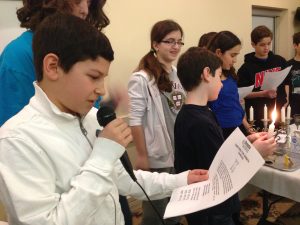
Our Jewish studies are based on a curriculum written specifically for us by Rabbi Eva Goldfinger and Rabbi Karen Levy. It is titled Values and History Based Curriculum for Secular Humanistic Jewish Supplementary Schools (©1995, 1999) and is in use not only at our school, but at other humanistic congregations as well.
In Oraynu’s curriculum:
The curriculum for each grade includes the following:

Gr. 1-7 Calendar: Click HERE
Gr. 1-7 Registration: Click REGISTER
Theme: The importance of the individual in the continuing evolution of the Jewish people and culture
Subject Content:
Theme: The importance of friendships as the microcosms of the human interactions necessary to create Jewish Community and culture
Subject Content:
Theme: The value of social responsibility and its expression in action emphasizing that social action can become a part of daily life
Subject content:
Theme: The function and dynamics of Jewish communities in history and today
Subject Content:
Theme: The Jews are a worldwide pluralistic people and civilization with varying beliefs and values which determine their practices
Subject content:
Theme: Through the study of relevant Jewish history, discover the role of each student as a responsible member of society
Subject content:
Theme: Secular Humanistic Judaism, our beliefs and their roots, our actions and their impact
Subject content:
Curriculum is subject to change
Our goal is for our students to learn to recognize and pronounce the Hebrew words we use on an everyday basis to discuss Jewish values, life cycle events, holidays, holiday symbols and Israel. Hebrew songs are also taught. If there is sufficient demand, an optional Enriched Hebrew class may be offered as a half-hour session before regular classes, drawing children from various grades.
Music is part of the schedule for each level taught at Oraynu Children’s School. The children learn secular Jewish songs in Hebrew, Yiddish, Ladino and English. Songs are appropriately tied to the seasons, the festivals and the B’nai Mitzvah ceremony.
We welcome your inquiry and would be pleased to answer any questions. You are welcome to visit our school and have your child/ren sit in on a class or two. For more info, contact our School Principal Risa Morris at: risa@oraynu.org.
Copyright © 2025 Oraynu Children’s School. All rights reserved. Website designed by Addicott Web. | Privacy Policy